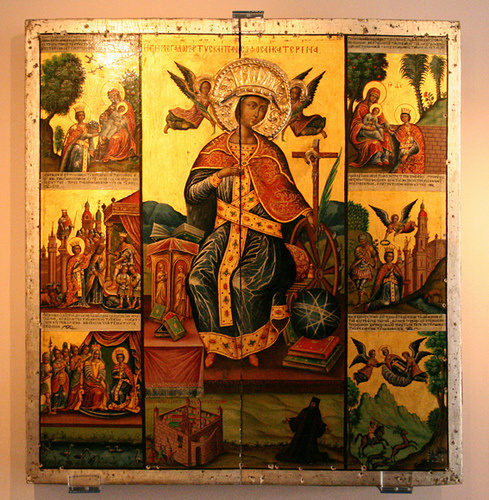19,000,000 you meant? That numbers sounds very hyperbolic. The entire population of Greece during the appex of the Roman Era (not after the significant depopulation after the 3rd century crisis and especially the 6th century pandemics) is estimated at circa 3 million. That of Italy at circa 8 million. And nobles of course were not any more than 5% of the population (and that's already an exaggeration of mine!).
Anyway, I meant that I'm not aware of persecution against anyone only for being a "Greek speaker". The Christians were also overwhelmingly Greek speakers (even their holy scriptures had been written in Greek).
Ι said greeks from sicily to Parthia, and from Egypt to Crimaia,
and from 313 AD to almost 900 AD.
and No the numbers might not been smaller,
consider the Greek world, even in Roman era expanded even in areas that Romans did not conquer,,
anyway, i had wrote characteristic chronicles, writers etc in another post,
the estimation was done by Ροιδης for 10 years,
And offcourse not only Greeks,
but also Romans and others,
Mediolanum Italy was once a slaughterhouse of pagan philosophers and is known.
@ Ygorcs,
just find out why Ambrosios of Mediolanum (archbishop) kick away Theodosios 1rst from his church,
it is known here in Makedonia as the slain Makedonians who resit against the Goths (Makedonians, slavs did not enter south of Balkans yet)
yet later at 380 he start a total anihilation of temples, and builds basilicas above
even at 961 AD the last true pagans with heratage and nobility were hiden in Crete,
Βριγγας Emperror Ρωμανος even ignored the incoming Arabs and send 2400ships to 3300 to some to erase the last nobles of Greek sacred religion,
it is estimated by most that in one night they slain 40 000 Cretans, while to some others to 270 000,
Κλεαγατη and Ζηνοκλεια are for most neo-pagans considered the last true priestress of the 'true ancient Greeks'
yet paganism survived in the dark era, and you can see that in some fiestas, or some dogmas, or believes,
the last 2 decades some of us try to organise some happenings, reconstruct some events, or gather in certain places.
The Roman law
Justinianus Codex 1 10 10
After that all Greeks hide our identity under the term Roman Ρωμιος (citizen follower and ethnicity as Roman)
so the number might not been big, but small.
it was not only in Greece Ygorcs, it was all over the empire and even outside ot it,
and there starts the big strange, the tottaly odd,
the best and the most educated and wise in Greek philosophy move to the desert
and they all learn by heart ancient greek poetry and philosophy, hidden and alone,
but they also learn christian liturgy so to pass easily the wrath,
living with almost nothing except their mind.
the first monks who chose their followers to continue the ancient knowledge,
while in big cities christian monks erase with lemon juice Archimedes palimpsista to write their 'wise' prayers
some others in the deserts and mountains under the skin and shape of a lonely monk transmit the knowledge to generations.
offcourse christianity as state religion and state law prevailed even to them. and they dissapear today
at 536 AD they burned all the Forests that had oak trees in Greece Cyprus and minor Asia, because Zeus was hidden in the forest, and they had to kill him, vanish him.
at 400 AD at Cyrenaike and Carhedonia they made a congress and at 401 they slain everyone who had a Greek or a Roman book outside christian ones, Πορφυριος porfyrius
he become a saint
https://en.wikipedia.org/wiki/Nikon_the_Metanoeite
yet most historians agree that the last pagans were around Sparta,
i believe they were in Crete.
EVEN AT 1700 AD THEY ATTACK OLD RELIGION
https://en.wikipedia.org/wiki/Michel_Fourmont
As for the West?
the burn of Fortuna
the Elvira illiberis
the bayeux
the 370 when Pope Damasos kills a rich old religion merchant,
Valentinianus starts a massive attack with the term,
Pope can not be judged by a mortal
the most possible is the assasination of Agorius Vettus and the reconstruction of Olympian Gods in Rome.
St Martiinos and the extremination of the Druids
376 AD, the transformation of Roman Legions,
the Slain of Mithras followers, very favorite in Roman military,
the ones left are forced to follow Christianity, it is not coincidence that pope decides Christmas at 25 December, (23 is the Day of Mithras)
enough
I would end with this,
Cesset mathematicorum tractatus. Nam si qui publice aut privatim in die noctuque deprehensus fuerit in cohibito errore versari, capitali sententia feriatur uterque. Neque enim culpa dissimilis est prohibita discere quam docere
I hope you understand now that from 300 to 961 AD 19 000 000 all over the empire might not be enough.
if someone want to study about that,
there is a book by Karlheinz Deschner
at Lugdunum the last pagans raise a new Roman emperror, the Eugenios Flavios,
same time is written the epistole 'to Roufinos'
after that old Religion Romans loose even their properties, a total anihilation of souls, things, land, etc, that filled up the empire with many riches.
the city of Harran in Greek Καρρες Καρρυες is the last place where pagan medicine resist the Christian one,
they are the only ones that Justinian plaque did not hit them
REMEMBER BY JUSTINIAN LAWS THE ONLY MEDICINE ALLOWED WAS lyches, pray and EXORCISM,
even Aristotle was denied as pagan.

